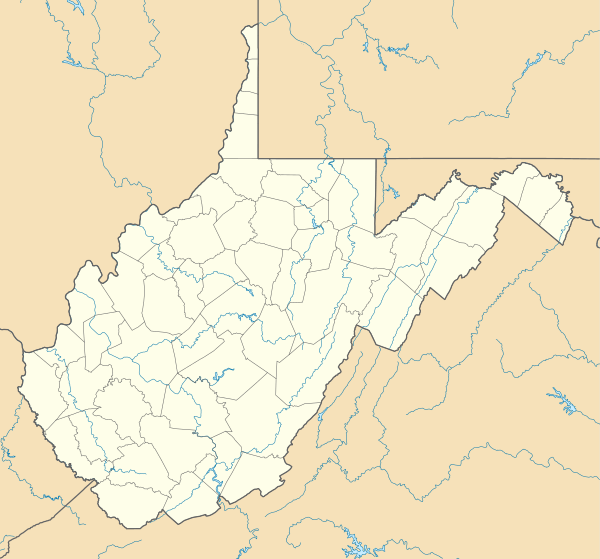Jefferson County Courthouse (West Virginia)
The first Jefferson County Courthouse was built in Charles Town, West Virginia, USA, in 1803, on a lot donated by Charles Washington. It was replaced by a larger building about 1836, which comprises the core of the present courthouse. The building is historically notable as the site of two trials for treason: that of John Brown in 1859 (treason against Virginia), and those of unionizing coal miners from Mingo County, West Virginia (treason against West Virginia), a consequence of the Battle of Blair Mountain, whose trials were moved from the southern part of the state in 1922 as a result of a change of venue.
Jefferson County Courthouse | |
_and_West_Virginia_State_Route_51_(Washington_Street)_in_Charles_Town%2C_Jefferson_County%2C_West_Virginia.jpg) Front of the courthouse | |
  | |
| Location | Charles Town, West Virginia |
|---|---|
| Coordinates | 39°17′20.78″N 77°51′35.32″W |
| Built | ca. 1836 |
| Architect | Unknown original architect, Phillips and Cockrill 1871 and A.B. Mullett 1910 |
| Architectural style | Georgian |
| NRHP reference No. | 73001910 |
| Added to NRHP | July 10, 1973[1] |
Description
The courthouse is a red brick building in the Georgian style with a prominent Doric pedimented porch. It has an unusual clock tower with a square dome that resembles Second Empire structures. The courthouse is set on a high stone foundation, facing onto a small yard enclosed by a metal fence. The porch has four Doric columns, with small copies of the portico's pediment over the main floor windows and front door, and a projecting central iron balcony on the upper level.[2] The first Mullett addition largely matches the main building, while the second addition features significant stone trim detailing.[3]
History

The first courthouse on the site was built in 1803, but was destroyed in a fire. Its replacement, the core of the present courthouse, was built in 1836-37 with its present Doric pedimented porch. During the American Civil War the courthouse was heavily damaged by cannon fire and was salvaged for metal. Was it torn down?[4] From 1865 to 1872 the courthouse was vacant, and court was held in Shepherdstown at McMurran Hall. In 1871-72 the building was reconstructed to a design by Phillips and Cockrill, keeping the façade, but little else. A disproportionately large cupola was added for the town clock on top of the porch at this time. In 1910 Alfred B. Mullett designed an extension to the rear, with a later [[Georgian Revival] addition comprising a jail and sheriff's offices.[3]
Two famous trials have taken place in the courthouse. The first was Virginia v. John Brown, John Brown's 1859 trial for treason against Virginia, fomenting a slave insurrection, and murder. Brown's captured associates, facing the same charges, were tried at the same time. All were found guilty and executed. The second was the trial of coal miners from Mingo County who had fought in the Battle of Blair Mountain, whose trial had changed venue to Jefferson County. The trials eventually moved to Morgan County, and then Greenbrier County.[2]
A former plaque at the entrance to the courthouse "in honor and memory of the Confederate soldiers of Jefferson County", placed in 1986 by the United Daughters of the Confederacy, was removed in 2018,[5] as part of the wave of removal of Confederate monuments and memorials that followed Dylann Roof's massacre.
References
- "National Register Information System". National Register of Historic Places. National Park Service. April 15, 2008.
- Ted McGee (March 7, 1973). "National Register of Historic Places Nomination: Jefferson County Courthouse" (pdf). National Park Service. Cite journal requires
|journal=(help) - Chambers, S. Allen, Jr. Buildings of West Virginia. Oxford University Press. pp. 540–541. ISBN 0-19-516548-9.
- Brammer, Robert (July 12, 2013). "The Jefferson County, West Virginia Historic Courthouse – Pic of the Week". In Custodia Legis. Library of Congress. Retrieved 13 January 2019.
- Heim, Joe (December 10, 2018). "Confederate plaque removed from W. Virginia county courthouse following vote". Washington Post. Retrieved 13 January 2019.
External links

- Historic American Buildings Survey (HABS) No. WV-21-4, "Courthouse, George & Washington Streets, Charles Town, Jefferson, WV", 12 photos, 2 data pages, supplemental material
- Law Librarians of Congress feature on the Jefferson County Courthouse
